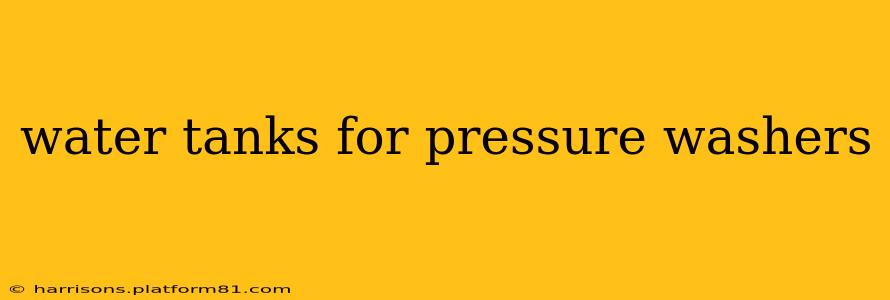Pressure washers are invaluable tools for cleaning everything from patios and siding to vehicles and equipment. However, their effectiveness hinges on a consistent water supply. For larger jobs or areas without readily available water sources, a water tank for your pressure washer becomes essential. This guide delves into the world of pressure washer water tanks, exploring their types, benefits, and considerations for selection.
What are the Benefits of Using a Water Tank with a Pressure Washer?
A dedicated water tank offers several key advantages:
- Increased Mobility: No longer tethered to a garden hose, you can move freely around your workspace, reaching even the most remote areas. This is particularly useful for cleaning large properties, boats, or RVs.
- Extended Cleaning Time: Say goodbye to constant refills! A water tank provides a substantial reservoir, allowing for extended cleaning sessions without interruption. This significantly boosts productivity.
- Access to Water in Remote Locations: Ideal for cleaning projects far from water sources, such as construction sites or rural properties.
- Consistent Water Pressure: A well-designed tank system can maintain consistent water pressure, leading to more efficient cleaning and preventing pressure fluctuations that can damage equipment.
- Convenience: The ease and speed of using a pre-filled tank is unmatched, especially when dealing with larger projects.
What Types of Water Tanks are Available for Pressure Washers?
Several types of water tanks cater to different needs and budgets:
- Portable Water Tanks: These are self-contained units, often made of plastic or polyethylene, with capacities ranging from a few gallons to several hundred. They're lightweight and easily transportable, making them perfect for smaller jobs.
- Tank-Mounted Pressure Washers: Some pressure washers come with integrated tanks, offering a compact and convenient all-in-one solution. These are often smaller capacity tanks, ideal for smaller tasks.
- Larger Capacity Tanks: For professional use or large-scale cleaning projects, larger tanks with capacities exceeding 100 gallons may be necessary. These often require a dedicated mounting system or trailer for transport.
How Much Water Capacity Do I Need in My Pressure Washer Water Tank?
The ideal water tank capacity depends heavily on the scope of your project.
- Small Projects (Decks, Patios, Small Vehicles): A 25-50 gallon tank is generally sufficient.
- Medium Projects (Larger Vehicles, Houses): A 50-100 gallon tank might be necessary.
- Large Projects (Commercial Cleaning, Construction Sites): You'll likely need larger tanks, potentially exceeding 100 gallons, and might even consider a system with continuous water replenishment.
Consider the water consumption rate of your pressure washer as well—this information is usually found in the owner's manual.
What Materials are Pressure Washer Water Tanks Made Of?
Common materials include:
- Polyethylene: A durable, lightweight, and relatively inexpensive plastic. It's resistant to corrosion but can be susceptible to damage from punctures.
- Stainless Steel: More expensive but highly durable and resistant to rust and corrosion. It's a preferred choice for professional use.
How Do I Choose the Right Water Tank for My Pressure Washer?
Selecting the right tank involves considering several factors:
- Capacity: Determine the water volume needed for your typical cleaning jobs.
- Material: Choose a material based on durability and budget requirements.
- Portability: Consider the weight and size of the tank and whether you'll need to move it frequently.
- Compatibility: Ensure the tank is compatible with your pressure washer's inlet size and pressure rating. Check your pressure washer's manual for specifications.
Can I Use Any Tank for My Pressure Washer?
No. It is crucial to use a tank designed specifically for pressure washers. Regular water storage tanks may not be able to withstand the pressure generated by a pressure washer, potentially leading to leaks or damage.
How Do I Maintain My Pressure Washer Water Tank?
Proper maintenance extends the life of your tank:
- Regular Cleaning: Rinse the tank after each use to remove sediment and debris.
- Inspection for Leaks: Regularly check for cracks or leaks.
- Storage: Store the tank in a clean, dry place when not in use.
By carefully considering these factors, you can select the ideal water tank to enhance the performance and convenience of your pressure washer, unlocking its full cleaning potential. Remember to always consult your pressure washer's manual for specific compatibility recommendations.
